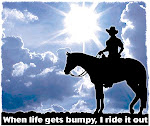
I loved Sally Swift's books and still have my original copy of 'Centered Riding'. Helped me to make my horse's job alot easier.
If you've never heard of Sally Swift or Centered Riding, check it out.
Your horse will thank you, too!
Visit: www.centeredriding.org
By STEPHEN MILLER of the Wall Street Journal
Adding a new-age spin to an ancient practice, Sally Swift garnered a world-wide audience for sensitive horsemanship with what she called "Centered Riding."
Borrowing from such body-awareness disciplines as the Alexander Technique and tai chi, Centered Riding stresses balance, breathing and visualization to meld rider and horse. "Imagine eyes in your chest that look in the direction of the turn," her book "Centered Riding" urged. She had this advice for nervous riders on ill-at-ease horses: "You can breathe a horse to quietness."
The book and a follow-up, "Centered Riding II," sold more than 800,000 copies in 15 languages according to Centered Riding Inc., a Perkiomenville, Pa., foundation devoted to propagating Ms. Swift's ideas. The technique is taught as a supplement to classical horsemanship at riding centers across the U.S. and in nations as far-flung as Norway and New Zealand.
Ms. Swift's techniques have been compared to Zen or Yoga on horseback, but they stemmed in part from her own awareness of body mechanics owing to a childhood condition, scoliosis. Therapy included a back brace, but also exercises that stressed body awareness.
"I was very fortunate because people in my circumstances were often put into full-body casts or had spinal fusions or other unpleasant experiences," she wrote in "Centered Riding." She added, "I was given the freedom of many years of enormous happiness on a horse."
The daughter of a hydrological engineer, Ms. Swift grew up outside Boston and had already been on horseback for several years when she was diagnosed with spinal curvature at age 8. Therapy "encouraged my riding, because it used both sides of my body equally," she told Horse & Rider magazine in 2000.
Worried that too much sitting would aggravate her condition, she postponed college and became a riding instructor. "Even the best riders and instructors, with their innate coordination, were not teaching people how to handle their bodies. They were teaching them only what to do," Ms. Swift wrote.
Several decades later, after a career in the dairy industry, she retired and went back to riding, but her back had deteriorated. "I was standing tipped to the side and was frequently in pain." A new round of therapy including the Alexander Technique and tai chi set her on course to developing Centered Riding. She said she later found that Eastern techniques had already been applied to other activities, including skiing. In recent years, "centered" approaches have emerged in driving and singing, says Denise McCluggage, author of "The Centered Skier
She continued to instruct into her 90s using body-awareness disciplines.
Adds Susan Harris, an equestrian author and former apprentice of Ms. Swift, "Now I see riding instructors using breathing control as a matter of course. Horses are much more sensitive than people realize, because they are prey animals."
Ms. Swift continued to instruct riders into her 90s at Southmowing Stables in Guilford, Vt. She said in the Horse & Rider interview that two things could bring tears to her eyes: a beautiful performance on a horse and a brass marching band.
In 2006, she was inducted into the U.S. Dressage Federation's hall of fame, which called her "a quiet ambassador for a more harmonious connection between horse and rider."
She died April 2 at age 95.









